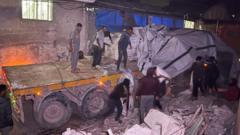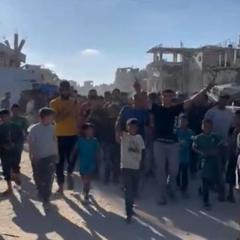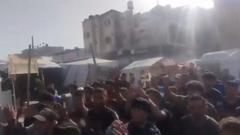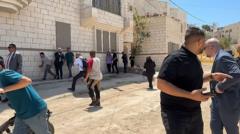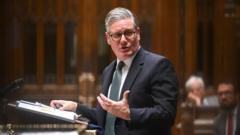Voices advocating for peace are gaining momentum in Israel as the ongoing Gaza war intensifies. A significant portion of the Israeli population is expressing dissatisfaction with the current military strategy and seeking a resolution, while prominent figures criticize government policies regarding the conflict.
Rising Dissent in Israel: Voices Against the Ongoing Gaza Conflict

Rising Dissent in Israel: Voices Against the Ongoing Gaza Conflict
Amid escalating violence in Gaza, a notable shift in Israeli public sentiment is emerging as anti-war protests and prominent leadership voices call for an end to the conflict.
As the conflict in Gaza escalates, discontent is brewing within Israel, with more citizens voicing their opposition to the ongoing war and its broader implications. Public protests against military actions have gained traction as anti-war activists, including a significant number carrying photos of children affected by the violence, have begun to mobilize in the streets.
Just recently, Yair Golan, an ex-IDF deputy commander and leftist politician, ignited controversy by warning that Israel risks becoming a pariah state if it does not alter its policies towards civilians. He stated emphatically on public radio that a rational country does not engage in military actions that lead to civilian casualties—including the deaths of infants—labeling such actions as abhorrent.
This sentiment was echoed by Moshe "Bogi" Ya'alon, a former defense minister, who asserted in a post on X that the ongoing military strategy was designed solely to ensure the government's power and would ultimately lead to national disaster. This shift in tone is stark when contrasted with attitudes from just 19 months ago when the conflict erupted, resulting in significant Israeli casualties.
The ongoing violence has left Gaza in dire conditions, with the WHO raising alarms about the healthcare system being overwhelmed by the humanitarian catastrophe. A recent Channel 12 poll indicated that a substantial 61% of Israelis now favor ending the conflict, while only a quarter support continued military occupation of Gaza. Despite this, Prime Minister Netanyahu insists on the necessity for a victorious campaign against Hamas, maintaining his base of support.
Former hostage negotiator Gershon Baskin highlighted a pervasive feeling of hopelessness among the general populace. He indicated that most families of hostages are increasingly calling for a cessation of hostilities in hopes of a diplomatic resolution.
This burgeoning dissent has sparked notable protests, with a recent demonstration in Sderot drawing around 500 participants, prominently featuring messages demanding an immediate end to violence and the safe return of hostages. Leaders of the Standing Together coalition—comprising both Jewish and Palestinian groups—are advocating for the recognition of the human cost of continued conflict, arguing that the war endangers lives on both sides.
Jewish and Palestinian activists are collectively pushing back against extremist elements within Israeli society, prompting international reactions. The UK has notably taken a firmer stance, imposing fresh sanctions and declaring their suspension of trade discussions with Israel while urging immediate humanitarian intervention in Gaza. The EU is also reconsidering its political ties with Israel, calling the military actions unjustifiable.
Despite the entrenched divisions within Israeli society regarding the war, activists like Uri Weltmann sense a change in public opinion, noting a growing acknowledgment that furthering the conflict endangers not only Palestinian civilians but Israelis as well, from soldiers to hostages. As conversations around peace strategies and humanitarian responses intensify, it appears the fabric of Israeli society may be in the midst of profound transformation regarding its collective stance on warfare.


